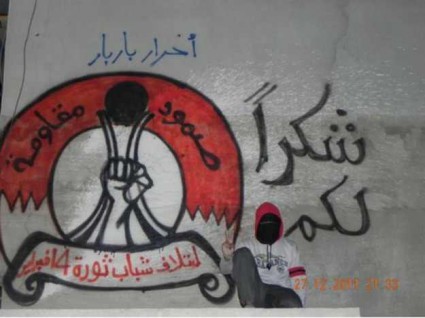Bahrain’s revolutionaries
Bahrain’s revolutionaries
By Toby C. Jones, Ala’a Shehabi – 2 January, 2012 – Foreign Policy
Bahrain’s February 14th movement has become a symbol of resistance and fortitude…and the most powerful political force in Bahrain today. This confederation of loosely organized networks, named after the date of the beginning of Bahrain’s revolution, is faceless, secretive, and anonymous. Its tens of thousands of supporters have abandoned the failed leadership of the country’s better established, but listless, political opposition. They have suffered the most and have weathered the worst that the regime has so far meted out.
Most outside observers, particularly policymakers hopeful that a political resolution is still possible, have mistakenly ignored the February 14th movement or deemed it irrelevant. The Bahraini government is not interested in reform or reconciliation. It has ignored calls for an end to its assault on pro-democracy forces, and in the last few weeks has actually intensified its crackdown. Security forces have once again laid siege to the country’s many poor villages, home to most of its Shiite majority as well as the country’s pro-democracy movement. Several people have been killed in the last month by police. Thick and choking tear gas has become a fixture across the island. This recent turn for the worse comes just over four weeks after the Bahrain Independent Commission of Inquiry (BICI), headed by the respected M. Cherif Bassiouni, released its report charging the government and security forces with using excessive force in its handling of street protests in the spring. Many had hoped that the report would signal a new opportunity for Bahrain’s competing political forces to come together and forge a way through the country’s impasse. Sadly, neither the government nor the mainstream opposition has risen to the occasion. The country’s political crisis is worsening as a result, and the prospects of reform fading from view.
This crisis was avoidable. Earlier this year, most supporters of February 14th called for political reform and for changes that would have, for the most part, kept the country’s power structure in place. This is no longer the case. Partly because of the government’s self-destructive political instincts and its poor handling of the country’s affairs, calls for the fall of the ruling al-Khalifa family have hardened, garnered greater support, and gained legitimacy. As February 14th moves in this more revolutionary direction, it will most likely pull the rest of the opposition along. Bahrain’s future will be determined by a test of wills between a government unwilling to accommodate change and an increasingly politicized youth movement unwilling to surrender.
The Bahraini regime has proven consistently unable to understand and combat the February 14th movement. The impulse behind Bahrain’s revolution and the foundation for today’s decentralized, but highly disciplined and organized, February 14th movement first took shape on the website bahrainonline.org. Launched in 1998, this forum receives over 100,000 visits a day and has long been a source of political activism. Last winter, a loose affiliation of anti-government cyber activists took to its pages, as well as Facebook and Twitter, and collectively organized a social protest movement. …more
January 2, 2012 No Comments
Young Sayed Hashim Sayed Saeed funeral create still more Protests and calls for end of al Khalifa regime rule
January 2, 2012 No Comments
Attempted Murder in drive-by by Security Froces – no one will be held accountable for obvious crime
January 2, 2012 No Comments






























